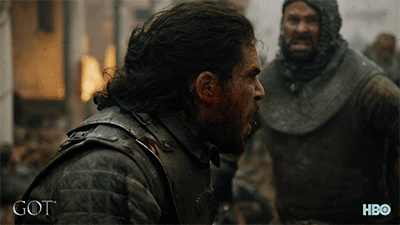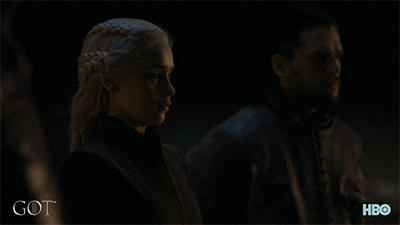Game of Thrones and laws of war: GoT analysis week 5
Do you hear the bells? Alas, they won’t stop the spoilers, so turn back now if you haven’t seen this week’s episode.
Oh Dany, Queen of Ashes and Breaker of well … everything. We knew this was prophesised and all (thanks for the spoilers, Bran), but did you have to so completely crash our war crimes database?
Writing the breakdown for this episode feels a bit like being a Dothraki on vanguard duty against the Night King.
Anyways, here it goes.
Compliance
Despite ratting out his best mate Varys (literally, the one guy who could have stopped the ensuing mayhem), Tyrion nevertheless gets a shout out for his multiple attempts to counsel Dany out of indiscriminately attacking Kings Landing and for repeatedly raising awareness of the fact that the Lannister’s would ring the bells throughout the city if they intended to surrender. Also, after recognising the harm that would befall the civilian population of Kings Landing from a head-on assault, Tyrion tries to engineer alternatives that would be less harmful to the civilian population, such as disrupting the Lannister’s command and control system by having Jamie ring the bells from behind the front lines.
Likewise, Jon deserves credit for putting himself in harm’s way after the ceasefire breaks down when he attempts to restrain the troops under his command and enforces the prohibition against rape as a method of warfare by defending a civilian against the advances of one of his own soldiers.

Arya and Ser Davos also need mentioning for their role in helping to evacuate civilians from areas of heavy fighting or airstrikes, even if they weren’t always successful.
It is not always easy to do the right thing in the fog of war, but there are real live examples of those who have upheld the law in the face of extreme pressures to do otherwise. One such example is US Army helicopter pilot Hugh Thompson Jr, who placed himself in harm’s way to prevent his comrades from committing atrocities during the My Lai Massacre.
Violations
As mentioned last week, Cersei’s use of civilian human shields is unlawful because it presents the opposing side with an impossible dilemma: either abandon the fight or risk killing civilians. However, even though Cersei is to blame for intentionally placing civilians near the Red Keep, our Targaryen duo and their forces still have a duty to make sure that any strikes against targets in King’s Landing don’t cause excessive collateral damage to civilians when compared with the military advantage they expect to gain from the attack. They must also do everything feasible to minimise the effects of their attacks on civilians, even if the civilians have been recruited as human shields.
The Unsullied get a strike this week for their treatment of Jamie Lannister, who – despite his fickle loyalties – is still entitled to humane treatment either as a POW or civilian detainee. Nobody deserves to be chained up by the neck.
When the attack first began, the fighting was more-or-less in line with IHL. Dany’s use of airstrikes was tightly focused on military objectives – namely, Euron’s fleet and the “anti-aircraft batteries” on the ramparts of the city walls. In the past, we have been ambivalent about the use of dragon fire as a weapon since it clearly causes great suffering to those who are burned by it. However, there was no other weapon in Dany’s arsenal that would have accomplished the same military advantage as Drogon’s dragon fire, so in the early stages of the battle, its use was awful but probably lawful.
As Grey Worm and Jon enter the breach in the city walls after one of Dany’s airstrikes, their fight against the Golden Company is likewise mostly in line with IHL. However, in a few instances, wounded soldiers are summarily executed, which is a violation of one of the oldest rules in IHL – soldiers that are out of action should no longer be targeted.
Then, those bells ring out and they awakened something buried deep in Dany’s genetic memory. The gods flipped a coin… and it landed on crazy.

In the GoT universe, the bells of King’s Landing serve the same purpose as a white flag in our own world. It is meant to be an instantaneously recognisable sign of surrender. When a soldier or an army surrenders, they are out of action and they are entitled to protection as prisoners of war. They must not be targeted, especially after laying down their arms, so Dany’s further attack was patently unlawful.
Use of dragon fire is arguably legal when directed at military objectives, but it is definitely a violation to indiscriminately use it against both military objectives and civilians or civilian property.
Furthermore, such attacks serve no military purpose, since the Targaryen army had already won the day. Therefore, no amount of civilian collateral damage could be considered acceptable and any further attacks against King’s Landing would be “wanton destruction not justified by military necessity”, a war crime.
Caught up in the moment, Dany’s troops on the ground followed her lead and likewise started killing soldiers and civilians without distinction.
Grey Worm, who is usually disciplined and self-restrained, receives special mention this week for launching the first blow against a Lannister soldier who had already surrendered.
The individual soldiers in the Targaryen army are each responsible for their own actions in the ensuing chaos, but those in overall command of the army had a special duty to take all reasonable measures to prevent and repress violations by their forces. The violations seen in this week’s episode include wilfully killing civilians and soldiers who are out of action and engaging in acts of rape or sexual violence. Arguably, Jon was trying to re-establish control and keep his soldiers from committing atrocities. However, by setting the example for her army through her indiscriminate attacks, Dany certainly bears some command responsibility for her troops’ subsequent misdeeds.
Best on Ground
This was a tough call this week because none of our contenders’ efforts were particularly effective. However, by providing good advice to the Targaryen army, Tyrion’s multiple attempts at preventing a massacre had the greatest potential to save the most lives, whereas the actions of Jon, Arya, and Ser Davos in the face of such carnage could only hope to protect a select few. Therefore, Tyrion wins BoG this week.
Worst on Ground
No contest – the Queen of Ashes.
Wait, how is that not a war crime?
In addition to the bonanza of IHL violations, this week’s episode had a number of epic grudge matches and straight up murders: Euron vs. Jamie, the Mountain vs. Qyburn (my money was on the Mountain), and the Mountain vs. the Hound. Given the brutality of these fights, it may be tempting to label these incidents as war crimes, but as odd as it sounds, not every crime that takes place during a war is a war crime. There must be a connection between the crime and the conflict. Since the fighting in these cases was not intended to advance one side of the conflict or the other, they are ‘just’ murders and would be illegal under national laws, exactly as they would be in peacetime.
Likewise, when Daenerys ‘fired’ Varys, she actually wasn’t in contravention of IHL. The rules of war are primarily designed to protect civilians, medical personnel, and enemy troops who are no longer in the fight. They don’t cover what one side of a conflict can do to their own forces. Nevertheless, by removing Varys from the payroll so brutally and without a trial, Dany did violate numerous provisions of International Human Rights Law (IHRL) – and probably also employment law.

Pause for thought
We try to keep these analyses light-hearted, but it is worth bearing in mind that some of the scenes in this week’s episode touch on some very real modern-day challenges associated with fighting wars in cities. As ever more people live in urban areas, it is becoming ever more important for combatants to respect the rules that prohibit placing military objectives near civilians and to respect the rules that relate to targeting. This is not just to avoid collateral damage to civilians, but also to avoid damaging or destroying the infrastructure that is vital for their survival, like water treatment plants and hospitals. Moreover, cities often contain a wealth of cultural heritage, which once destroyed, can make war-torn societies feel rootless and bitter towards the other side.
Things to watch
IHL is all about making choices that protect those who are not in the fight and which limit the extremes of armed conflict. These rules ultimately make it possible for former enemies to live together after the last bullet is fired and prevent never-ending cycles of violence. In week 1, we saw how atrocities affect post-conflict reconciliation on a small scale when Daenerys broke the news to Sam Tarley that she summarily executed his father for refusing to accept her authority. How loyal a subject will Sam be going forward? Now that Dany has won the Battle for King’s Landing, how easy will it be for her to win the peace if everyone living there has a similar painful experience?
Well, that was an IHL marathon. Thanks for hanging in there and we look forward to exploring some more of these post-conflict issues next week.
Want to check back on our original stats? Read our Season 1–7 analysis.
This week’s summary brought was to you by Noel Trew, International Law Department, British Red Cross (that’s right, we’ve gone global).
Charity donations of $2 or more to Australian Red Cross may be tax deductible in Australia. Site protected by Google Invisible reCAPTCHA. © Australian Red Cross 2024. ABN 50 169 561 394